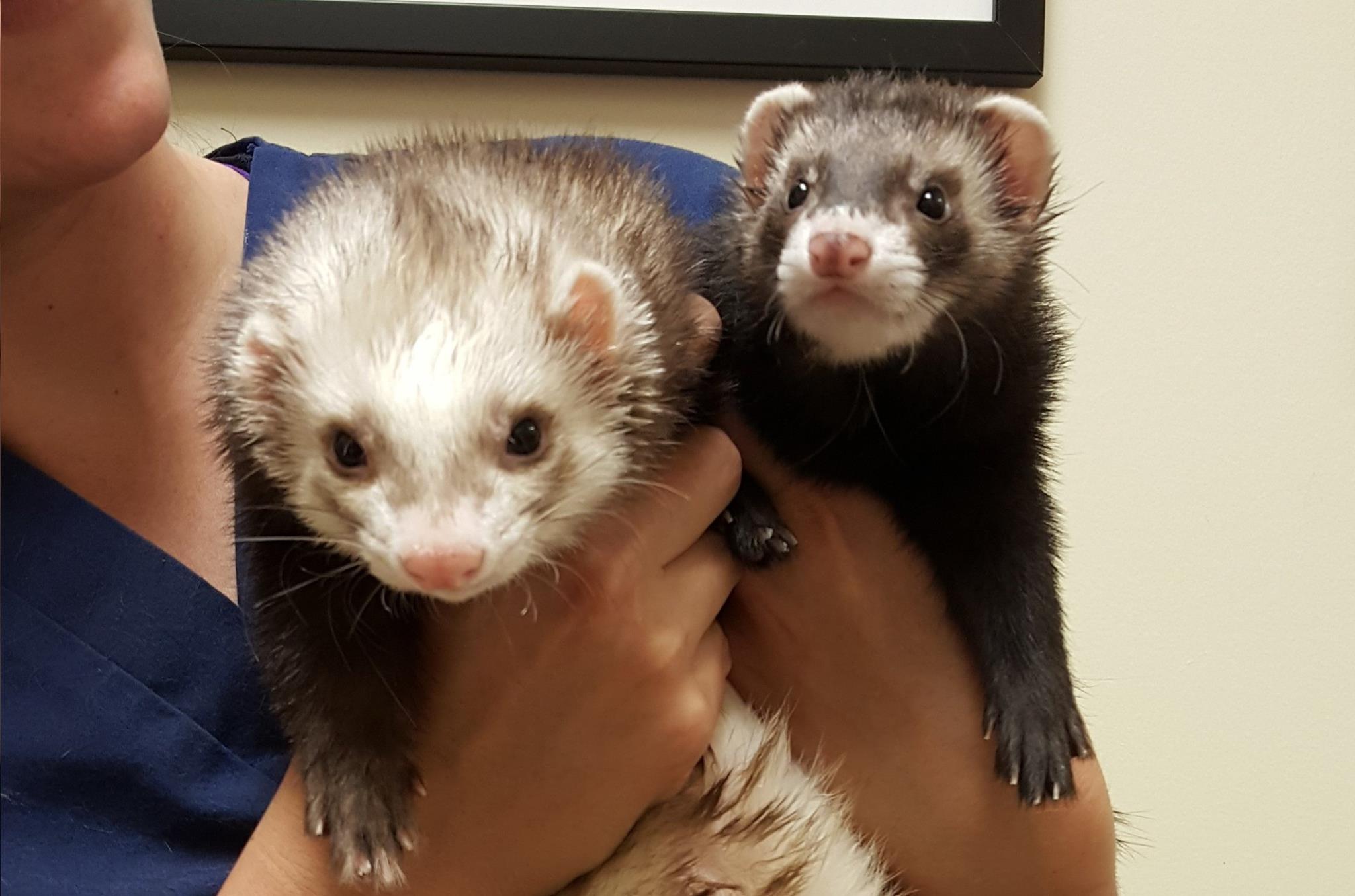 Veterinary Well-Check
Veterinary Well-Check
- It is important to have a complete physical exam by your veterinarian on your new pet and then annually.
- Your veterinarian will examine the eyes, ears, teeth, heart, lungs and will palpate the abdomen and examine genitalia.
Laboratory Testing
- A fecal (stool) examine is also recommended to check for intestinal parasites.
- It is recommended that once a ferret is 3 years of age that, in addition to yearly vaccinations, they have yearly blood work to better evaluate its health.
Vaccinations/Injections:
- Ferret distemper vaccination
- Rabies Vaccination
- It may be recommended to, get annual “Lupron” injections in January/February to help block the excess hormones after the ferret turns six months old to delay or prevent the onset of disease.
Housing
- Many ferret cages have several levels to allow for more surface area for the ferret to climb and play. Sleeping areas should be provided. You can offer towels, old T-shirts or purchase a “ferret hammock”. Check bedding daily for signs of chewing- especially in younger ferrets.
- A litter box should be provided in one corner of the cage. Use a low dust litter like those made from paper pulp – Carefresh Bedding and Yesterdays News both work well. Ferrets tend to move litter boxes around, so you may want to secure the box in the corner.
- Allow your ferret supervised daily exercise time out of the cage. Ferrets love to play in boxes and run through tubes. Dryer vent hoses that you can purchase from a hardware store work well. Small, hard rubber dog toys or ones with squeakers usually appeal to ferrets. Watch your ferret closely to be sure it doesn’t chew pieces off the toy.
Diet and Nutritional Supplements
- Feed a commercial ferret food such as Totally Ferret or Marshall Farms Ferret Food. Cat/Kitten foods are not recommended because they are not nutritionally balanced for ferrets and can cause health problems as the ferret gets older. Feeding raw diets is not recommended because they are difficult to balance and can cause bacterial infections.
- Some ferrets enjoy occasional treats such as raisins, Cheerios, or Pounce cat treats. Ferretone or Linatone can be offered as a treat and both can help keep the skin from becoming dry indoors.
- Laxatone or Petramalt (cat hairball preventatives) should be offered to your ferret 3 times a week. Hairballs are especially a problem as the ferret gets older and can cause the intestinal tract to become blocked
- Geriatric ferrets should be transitioned to a senior ferret food because as they get older they have different nutrient requirements than when they were younger.
Common Medical Problems
Foreign Body
Young ferrets tend to eat things that they shouldn’t – especially when they are not being supervised. The intestinal tract may become fully or partially blocked by the consumed item and cause a serious medical emergency that will require surgery.
- Favorite edibles are items like: remote control buttons, felt or rubber padding, rubber soled shoes and shoe linings, small plastic toys and their parts, foam or stuffing from stuffed animals or pillows, cherry pits and any other small item made out of these materials.
- We also see hairballs in older ferrets that will cause a blockage and can require surgery to remove them.
Influenza
Ferrets can contract the human influenza virus. Symptoms include sneezing, coughing, fever and lethargy. There is no treatment for the virus, but sometimes very young or very old ferrets will benefit from supportive care while the virus "runs its course". Treatment may include antibiotics and fluid therapy if the ferret has stopped eating.
Green Diarrhea
ECE is an extremely contagious virus that ferrets pass to one another. Clinical signs include explosive diarrhea (possibly green), lethargy and the ferret will have a history of contact with a new ferret. Because ECE is a virus there is no specific treatment for it, but most ferrets benefit from supportive care. This virus can be extremely dangerous in young and older ferrets and can even cause liver disease or death. If you suspect that your ferret may have ECE call your veterinarian for advice immediately.
Adrenal Gland Disease
Most ferrets over the age of three will get adrenal gland tumors. Symptoms include hair loss over the tail and pelvis/hip area of the body, dry itchy skin, a swollen vulva in female ferrets, and difficulty urinating (due to enlargement of the prostate gland) in male ferrets. Treatment for adrenal gland disease includes either surgical removal of the affected adrenal gland or monthly injections with a drug called Lupron. Lupron will help treat the symptoms but will not cure the ferret of the disease.
Insulinoma
Many ferrets over the age of three will eventually get insulinoma (tumors on the pancreas). Symptoms include lethargy, hind end weakness, decreased appetite, chronic weight loss, difficulty waking the ferret after sleep, drooling, pawing at the mouth, coma and death. The symptoms are caused by low blood glucose and get worse the lower the glucose becomes. Insulinoma is often diagnosed with yearly geriatric blood work. Treatment includes oral steroids for the rest of the ferret’s life. Surgery for insulinoma can be performed but isn’t recommended as the tumors rapidly grow back post surgically.
Dental Disease
Brushing your ferret’s teeth may be challenging but it will help prevent tartar build up and gingivitis. Dental disease is common in old and young ferrets so brushing their teeth with a small toothbrush and a dog/cat toothpaste will help prevent this.
